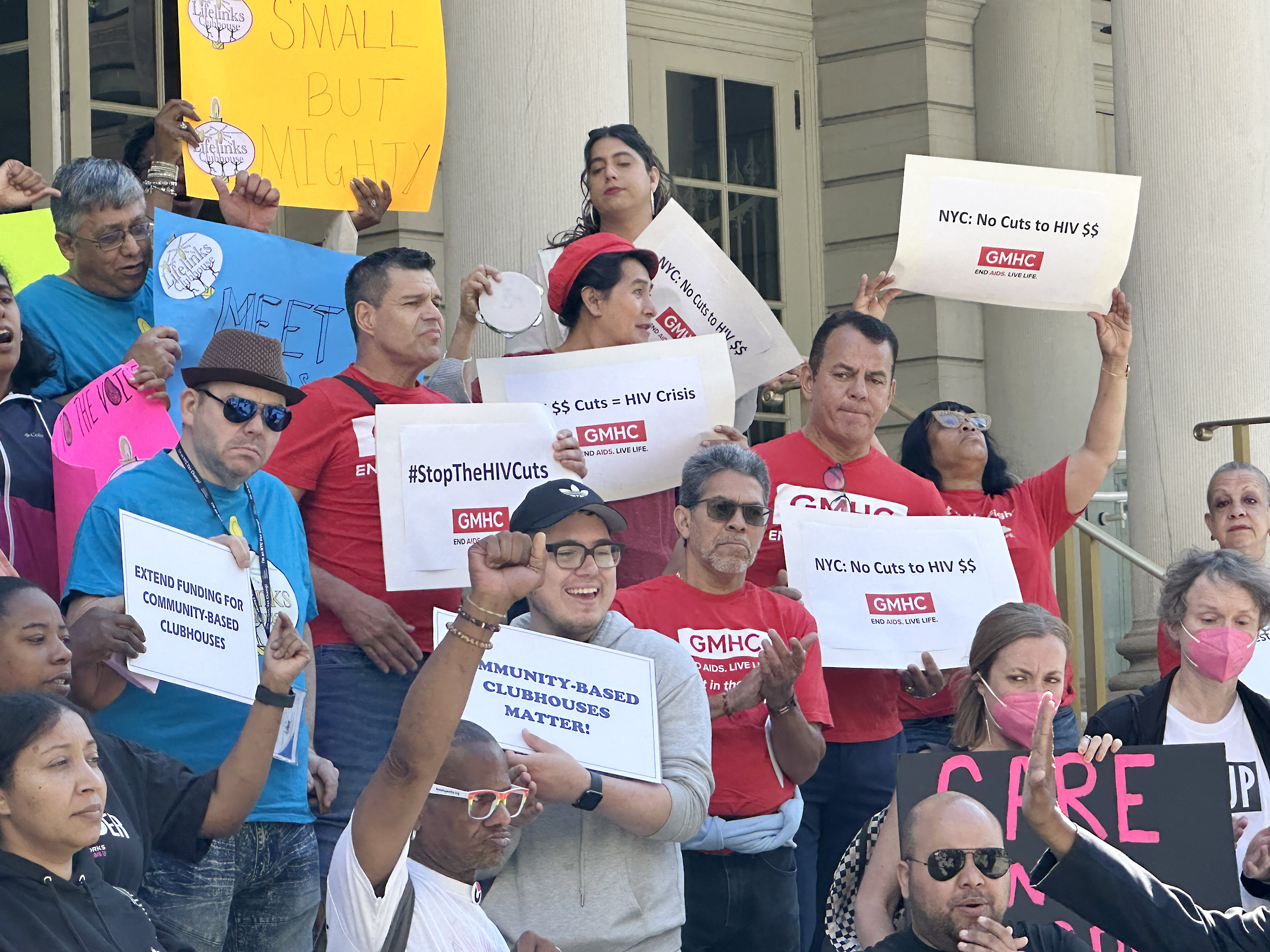GMHC’s small but mighty Public Policy Department has shown that when our community organizes and advocates, we can win.
When the agency learned in January that New York City Mayor Eric Adams proposed to cut a $400,000 city contract for a key GMHC workforce development program that serves people living with HIV and AIDS, Vice President of Public Policy and External Affairs Jason Cianciotto and our policy interns quickly organized an advocacy campaign to preserve the Realizing Independence Through Support and Employment (RISE) program.
Then in April, the mayor subsequently announced $5.3 million in proposed cuts to HIV and AIDS services organizations across the city, including $644,000 for two additional GMHC programs: Undetectables and HIV Prevention and Literacy: Older Adults (HLA).
These three programs, employing 13 staff, serve hundreds of GMHC clients and empower people diagnosed with HIV to live full and productive lives.
In response, Cianciotto and his team mobilized a broad coalition of community advocates to fight back against the cuts. That included agency staff and clients, members of fellow HIV and AIDS organizations, community advocates, and strong allies in the NYC Council.
“We rose to the occasion,” Cianciotto said. “We immediately saw that it was critical to speak out and push back against the mayor’s proposed budget cuts to save these programs – not just for us, but for other community service providers in the coalition. So GMHC stepped up.”
The clock was ticking since the NYC Council had to approve and pass a final FY2025 budget by June 30. Otherwise, these vital programs would end on July 1.
Organize and Advocate
The mayor’s HIV funding cuts to the New York City Department of Health and Mental Hygiene (DOHMH) included its Undetectables initiative, which connects hard-to-reach people living with HIV with care and treatment to reduce their viral load to an undetectable level.
GMHC’s Undetectables program served 70 clients last year, which the agency was on track to double this year. Housing Works, Callen-Lorde, and six other HIV and AIDS organizations also receive Undetectables funding from the health department.
Our entire community joined together for the fight. GMHC mobilized supporters to send almost 300 emails protesting the cuts to the mayor and NYC Council members. To spread the word, we deployed a digital media campaign, on-the-ground advocacy at AIDS Walk New York in May, and media interviews.
The NYC Council’s LGBTQIA+ Caucus sent their own public letter to the mayor and their city council colleagues, calling on them to restore the cuts. Then, LGBTQIA+ Caucus Co-Chair Erik Bottcher followed up with an op-ed Gay City News.
Meanwhile, Victoria Graves, a GMHC Peer Educator for the HIV Prevention and Literacy: Older Adults Program, and Valentina Batalla Vidal, a bilingual Vocational Case Manager for GMHC’s RISE program, eloquently testified at the NYC Council’s Health and General Welfare committee meetings, while staff met with dozens of NYC Council members and Mayor’s Office leaders.
On June 11, as the FY2025 budget deadline rapidly approached, over 80 leaders, staff, and clients from GMHC, Callen-Lorde, Housing Works, and other affected organizations held a rally on the steps of NYC City Hall to demonstrate against these drastic cuts. They were joined by activists from ACT UP NY and many NYC elected officials: Councilmembers Erik Bottcher, Gale Brewer, Tiffany Cabán, Shekar Krishnan, and Linda Lee, Manhattan Borough President Mark Levine, and NYC Public Advocate Jumaane Williams.
To increase the pressure, GMHC, Callen-Lorde, Harlem United, and Housing Works collectively announced a boycott of the NYC Pride March on June 30.
Our community’s advocacy push paid off. On June 30, the NYC Council voted to adopt a $112.4 billion FY2025 city budget that restored $5.3 million in health department funding for GMHC and other HIV and AIDS service providers. That included the DOHMH contracts, totaling almost $688,000, for our Undetectables and HIV and Aging programs.
We specially thank NYC Council Speaker Adrienne Adams and Health Committee Chair Lynn Schulman, and City Council LGBTQ+ Caucus co-chairs Bottcher and Cabán for their committed leadership and advocacy.
In an incredible development, Adams, Schulman and their colleagues worked with the Mayor’s Office to “baseline” the DOHMH funding. That makes it a permanent part of the city budget, so it doesn’t require annual negotiations for inclusion. “I am so happy NYC Council was able to baseline HIV/AIDS programs for the first time,” Schulman tweeted after the NYC budget-signing ceremony.
Despite our efforts, the final city budget for FY2025 did not restore a separate funding cut to the NYC HIV/AIDS Services Administration (HASA) for workforce development. That ended GMHC’s $400,000 HASA contract for our RISE program. Thankfully, we’ve found a way to continue this key workforce program for people living with HIV by using federal 340B funds through our partnership with Avita Pharmacy.
Stay in the Know
Sign up to receive our monthly newsletter, updates about events, and other helpful information.

